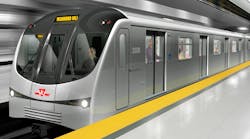Ontario passes bill expediting transit planning, design and construction into law
Legislation that will expedite the planning, design and construction process of transit projects in the province of Ontario passed into law July 7. Bill 171: Building Transit Faster Act, 2020, enables the province to speed the process of building Ontario’s four priority transit projects: Ontario Line, the Yonge North Subway Extension to Markham and Richmond Hill, the three-stop Scarborough Subway Extension and the Eglinton Crosstown West Extension to Pearson airport.
"Getting more transit built faster will help reduce gridlock, deliver a modern rapid transit system for the province and become a major contributor to our economic recovery," said Ontario Premier Doug Ford. "These four priority transit projects will create thousands of jobs, provide more housing options for people, and open up countless opportunities for businesses throughout the Greater Toronto Area (GTA) and beyond."
The provincial government says the legislation supports Premier Ford's "New Subway Transit Plan for the GTA" ― representing the largest subway expansion in Canadian history.
Key inclusions of the legislation are:
- Enabling relocation of utilities more efficiently, while treating businesses fairly, and ensuring costs are not passed on to consumers;
- Better enabling the assembly of land required to construct stations, conduct tunneling and prepare sites, while treating property owners fairly;
- Ensuring timely access to municipal services and rights-of-way;
- Allowing the province to conduct due diligence work and remove physical barriers with appropriate notification to property owners; and
- Ensuring nearby developments or construction projects are coordinated so they do not cause delays.
"During consultations and throughout debate, we heard a common theme from a wide range of people who reinforced how important it is to not only build transit quickly, but to also get it right," said Caroline Mulroney, Ontario Minister of Transportation. "That is why we've focused solely on eliminating the roadblocks that cause unnecessary delays, so we can deliver these major transit projects as quickly and cost effectively as possible."
However, the bill did have its opponents including Jessica Bell MPP, University–Rosedale, who is also the Opposition Transit Critic. In a tweet following the passage of the legislations, Bell said the bill did “utterly nothing to address the two main reasons why transit is delayed: changing transit plans at the last minute and failure to fund transit.”
In an official statement, Bell says the Ford government “runs roughshod over the planning process, residents, cities and businesses.”
“Transit planning should follow the mantra measure twice and cut once. This government is trying to measure and cut at the same time. No good will come from that,” said Bell.
While the bill addresses planning of transit projects, the question of how to pay for them remains. The estimated cost of the four priority transit projects is C$28.5 billion (US$21.7 billion). Premier Ford had previously committed C$11.2 billion (US$8.14 billion) to the projects, but wants the federal government of Canada to commit at least 40 percent or $11.4 billion (US$8.29 billion) to the projects.
"Now that legislation has passed, we continue to call on the federal government to come to the table and fund at least 40 percent of these nationally-significant subway projects that will provide a modern, efficient rapid transit system, benefiting all transit riders and taxpayers," said Kinga Surma, Associate Minister of Transportation (GTA). "With the passage of this bill, we can get shovels in the ground sooner and get skilled people back to work as we restart the economy and recover from COVID-19."

Mischa Wanek-Libman | Group Editorial Director
Mischa Wanek-Libman is director of communications with Transdev North America. She has more than 20 years of experience working in the transportation industry covering construction projects, engineering challenges, transit and rail operations and best practices.
Wanek-Libman has held top editorial positions at freight rail and public transportation business-to-business publications including as editor-in-chief and editorial director of Mass Transit from 2018-2024. She has been recognized for editorial excellence through her individual work, as well as for collaborative content.
She is an active member of the American Public Transportation Association's Marketing and Communications Committee and served 14 years as a Board Observer on the National Railroad Construction and Maintenance Association (NRC) Board of Directors.
She is a graduate of Drake University in Des Moines, Iowa, where she earned a Bachelor of Arts degree in Journalism and Mass Communication.





